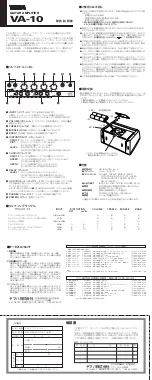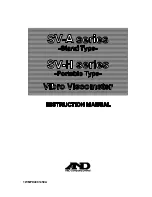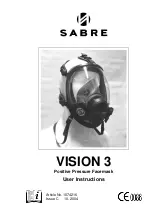
7
◊
◊
IMPEDANCE GUIDELINES
—Before changing your
speaker setup, a basic knowledge of impedance
ratings is essential to the quality of your sound and
to the safe operation of your equipment.
The general rule is: if you connect a speaker load
with a total impedance that's equal to the mini-
mum impedance rating of your amplifier, you'll be
OK—as long as the speakers are rated to handle
the power output from your amplifier.
The illustration shows the impedance totals of dif-
ferent speaker combinations. NOTE: All SWR® bass
speaker enclosures, as well as most others, are
wired "in parallel" (not series), therefore,
this sec-
tion applies to parallel speaker connections only.
All speakers in a group should have the same
impedance so that each speaker will receive the
same amount of power from your amplifier.
If impedances are different, the speakers with lower impedances
will be much louder than the rest.
For example, with an 8–ohm
speaker and a 16–ohm speaker both connected to your
amplifier, the 8–ohm speaker will be twice as loud (and
get twice the power) as the 16–ohm speaker. Calculating
total power handling capacity and positioning speakers of
different impedances becomes complicated!
Δ
CAUTION!
—Operating with a speaker load
below
the
minimum impedance rating of your amplifier can
easily overheat the amplifier and cause damage.
Operating
above
the minimum impedance rating
will reduce the amplifier’s maximum power output
potential.
For an in-depth discussion of impedance and
power rating issues go to the SWR Website at
swrsound.com/support/setuptips.php
—this article
by SWR founder Steve Rabe ran in the August ’92 issue of
Bass Player™ Magazine.
F. ACTIVE TONE CONTROLS—
Shelving type, 3–band
equalization:
• BASS—
Adjusts low-frequency response ±15dB in the
30Hz–150Hz range.
• MID—
Adjusts mid-frequency response ±15dB in the
400Hz to 3kHz range.
• TREBLE—
Adjusts high-frequency response ±15dB in the
2kHz to 14kHz range.
G. WEDGE EQ—
Use this tone circuit preset when playing
the amplifier with the cabinet in the tilt-back position to
compensate for the loss of cabinet floor contact and the
redirected tweeter horn.
H. LIMITER—
This circuit protects the power amp and speak-
ers from damage by governing peak signal strength. The
benefit is that you to can play at maximum loudness lev-
els without risk. DEFEAT turns the Limiter OFF.
DEFEATED
(LIMITER OFF)
LIMITER ON
ACTIVE—
Indicates exactly when the LIMITER circuit is
working (when LIMITER is ON).
POWER AMP CLIP—
Indicates when the power amp
is being overdriven causing signal distortion. Unlike
preamp clipping,
power amp clipping can be harmful to
your equipment.
Therefore, if the POWER AMP CLIP LED
flashes often, engage the LIMITER or turn down the
MASTER Volume {C}.
I. EFX BLEND—
Functional only when a plug is inserted
into the EFFECTS RETURN {O} jack, this knob sets your
effects level by controlling the amount of "wet" effects
loop
signal blended into the "dry" preamp
signal.
J. POWER SWITCH—
Switches the unit ON-OFF as indicated
by the LED.
Y. LINE LEVEL MONITOR INPUT—
Δ CAUTION! Δ
For line-level
inputs only!
Amplified (speaker level) inputs will damage
your equipment!
Insert a 1/4-inch plug from a
line-level
audio
source such as:
• Line Out
from another bass rig—expand your output for
larger venues,
• Monitor Send
from a mixing board—mix in some vocals
or monitor them separately,
• Headphones Out
on a CD/MP3 player—for accompani-
ment (use a stereo-to-mono adapter to hear both chan-
nels of your player).
MONITOR VOLUME—
Adjusts the level of the
MONITOR INPUT signal. MUTE {B} also affects the
Monitor Input level.
Z. TWEETER LEVEL—
Sets
the output level of the
piezo tweeter for the
amplifier (not just the
Monitor Input). Select:
ON for maximum output,
–6dB for 50% output, or
OFF to mute the tweeter.
Front Panel
Monitor Input Panel

























